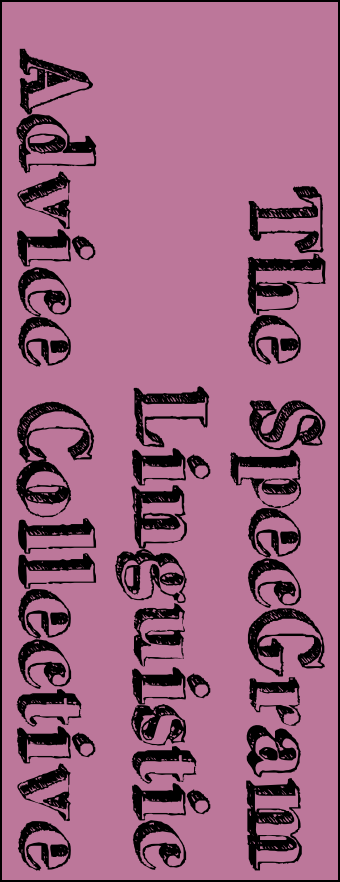


Are you in a world of linguistic hurt? The SpecGram Linguistic Advice Collective (SLAC) will offer you empirical, empathic, emphatic advice you can use!*

Remember, if you can tell the difference between good advice and bad advice, then you don’t need advice! So, if you need advice, trust us
Dear SLAC Pack,
I’ve been having a hard time explaining to my family and non-
—Stuart Dent
Linguistics is the scientific study of language as a system.
To assume that there are ‘languages out there’ in the world, which can be systematised according to morphology (word structure), syntax (sentence structure), semantics (meaning) etc., is a big assumption, but supposedly something on which linguists are meant to agree. I don’t agree with that, but I’ve worked on that assumption to get sh$t done. And to remain paid.
—SLAC Unit #4a6f73687561
Dear Stu,
Linguistics is not science, but rather silence. Not the kind of silence you get after reading a passage of Derrida to a physicist, nor even the kind of silence that ensues when a safety-
—SLAC Unit #4b65697468
Dear Stu:
Linguistics is not so much a sandwich as a hotly contested sandwich factory, in which the cooks argue over what morphological meat if any is to be placed between the highly mustarded phonology ciabatta and lightly mayonnaised syntax flatbread.
—SLAC Unit #4d696b61656c
Dear Dental Stew,
Based on the morphology (to pick a phrase which linguists love!), linguistics is closely related to physics, genetics and economics and is therefore a science. (Find me an -ics in the arts and I’ll buy you a year’s subscription to Teach Yourself Loglan!) Further word-
—SLAC Unit #4465616b
Dear Stewed Enchilada,
Contra SLAC Unit #4d696b61656c, linguistics is, in fact, a sandwich. In the center is the buttery, protinutious goo of finding as many ways as possible to demonstrate that all languages are secretly the same language wearing different combinations of colored contacts and fake mustaches. Next to this is the sugary yumminess of collecting all 6207 words for red. And all this is sandwiched between the bread of actually understanding human brains, the bread of making useful computer models, the bread of explaining why the weirdness scale of languages runs precisely counter to the intuitions of Americans, the bread of recording as many people as possible making funny noises, ... Wait, how many sides does a sandwich have again?
—SLAC Unit #44616e69656c
Dear Stewed Crouton,
Actually, linguistics is basically a multicultural food restaurant with a whole mess of offerings available hot and greasy Texas-
—SLAC Unit #4d696b61656c
Dear Little Stu, Piddly Little Stu,
Linguistics comes from a combination of the words linguiça and sticks, which explains why the field was traditionally a big sausage fest. Semanticists categorize it as a sandwich ingredient. Syntacticians argue about the proper way to put it between two slices of bread. (Note the similarity between grammar and granary. Universal grammar started out as a joke, but few people understood Chomsky’s rye humor.) If your friends think that linguistics doesn’t cut the mustard, just tell them they don’t have the stomach to see how the sausage gets made.
—SLAC Unit #56696e63656e74
Dear Souperman,
Please disregard SLAC Unit #44616e69656c’s advice on culinary matters. He views all things as sandwiches. Even hot dogs
—SLAC Unit #456d696c79
To Whomever It May Concern,
It would seem apparent that linguistics is what people study when they like languages but don’t want to spend the time actually learning more than one. That would explain why so much of linguistics is done on and in English and why it took so long to realised that SVO wasn’t some fixed rule. Nowadays, you can find linguists working in such esteemed areas as, making sure your smarthome gadgets tell the neighbours what you said about them, taking money from investors for gadgets that turn your speech into another language (while telling the neighbours what you said about them), and other stuff involving field trips that I don’t quite understand.
Either that or linguistics is involved in discovering deeper truths about languages and communication. But I don’t know if anyone really cares about that.
Sorry, what was your question again?
—SLAC Unit #4a6f6e617468616e
Dear DentStuartDent,
We’re linguists here, not lexicographers. Our role is to study the relationship between form and meaning in the abstract, not merely dispense definitions on demand.
—SLAC Unit #50657465
Indeed, aren’t definitions the responsibility of your aunt Susie?
—SLAC Unit #56696e63656e74
Dear Arthur,
Just tell them that linguistics is mostly harmless.
—SLAC Unit #54726579
* Advice is not guaranteed to be useful, practical, or even possible. Do not attempt at home. Consult a doctor (of linguistics, philology, or
 |
Linguistic Sub- |
 |
Onomastic Destiny ♀ |
 |
SpecGram Vol CLXXXIX, No 1 Contents |